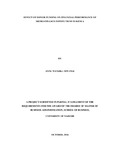| dc.description.abstract | The extraordinary dependence on donor capital influences microfinance, where financial performance and sustainability is essential. Adequate flows of donor assets are not an assurance for financial feasibility of MFIs. In Latin America and South Asia, the MFIs are well established but are challenged to improve their commercial feasibility. However, the emerging and donor dependent MFIs in sub-Saharan Africa strive to have a positive financial performance. The MFIs in Kenya offer much needed, but hitherto scarce, financial services to the financially excluded population. Over the years, microfinance institutions (MFIs) in Kenya have been enjoying subventions and donations from government and benefactors. However, donor capitals and government grants are falling short due to the latest global downturn. An information gap remains and thus the necessity to find out the impact of donor funding on financial performance of MFIs in Kenya. This study thus, pursues to answer the following study question: What is the effect of donor funding on financial performance of MFIs in Kenya? This descriptive cross-sectional survey research design was applied in the study. The fifty-seven microfinance institutions in Kenya formed the target population. This was a census study and therefore all the 57 MFIs in Kenya were selected to participate in the study, giving the study a sample of 57 MFIs. The researcher mainly drew data from secondary source. The secondary data was obtained from the published annual financial reports spanning for a period “t” spanning for five years (2011-2015). Quantitative data from mainly secondary sources was stored in a database and was analysed through descriptive statistics. Multiple regression analysis was used to assess the relationship between donor funding and financial performance of MFIs in Kenya. From the findings, the study concludes that donor funding contributes significantly to improvement in financial performance of MFIs. Donor funding significantly influences financial performance of MFIs. The MFIs financial performance has increased steadily over the study period. There has been a steady increase in amount of donor funding received by MFIs in Kenya. The study recommends that the banking industry regulator, the Central Bank of Kenya, should review donor funding to MFIs policy to ensure that MFIs have ease of access and that they increase their reach to the unbanked population. The management of MFIs should scale up their marketing and customer mobilization efforts to compete effectively with other financial institutions like commercial banks | en_US |



